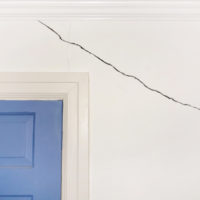Disputes Involving Construction Defects

A common reason for a construction dispute is a construction defect. Buyers of new construction are making substantial investments and expect their new homes to be free of the problems often found in older buildings. Therefore, if a defect is discovered, a construction defect lawsuit may be filed and the professionals who built the structure may be liable for the financial damages incurred by the homeowners.
For those involved in disputes or litigation concerning construction defects — plaintiffs or defendants — consult with an experienced Florida construction litigation attorney skilled at representing their clients’ best interests in negotiations, arbitration, and trial.
What are Construction Defects?
A construction defect is defined as a flaw or design error in the construction of a building due to poor workmanship or inferior and defective materials or systems used on the project. A construction mistake can decrease the habitability of a home, reduce its value, and may cause harm to the homeowner. Some construction defects are obvious and become noticeable soon after construction on the building is finished; these are known as “patent” defects. “Latent” defects are hidden and not noticeable until months or years have passed. The most common types of flaws involve:
- Mold
- Water and plumbing problems
- Defective heating and electrical systems
- Cracks in the foundation, floor, wall, and roof
- Improperly analyzed and prepared soil
- Poorly planned landscaping and faulty drainage
- Dry rot and other framing issues
- Structural failure
Who is Held Responsible?
Generally, in a construction defect lawsuit, the builder, developer, or general contractor is held as the responsible party. Sometimes, the architects or designers are also brought into a lawsuit as additional defendants. Typically, general contractors and developers are responsible for the work of the subcontractors they brought on to the project.
What are the Legal Grounds to Sue?
Homeowners that discover a construction defect can file a lawsuit citing a variety of legal grounds. In construction defect lawsuits, common causes of action that can be brought against a builder, developer, or general contractor include:
Negligence — With a negligence claim, sometimes called negligent construction, the plaintiff must show that the defendant failed to exercise reasonable care, workmanship, and professional skill during the construction of the building which resulted in their work not meeting industry standards. Generally, a negligence action is brought if the construction defect posed a safety hazard or caused injury to the homeowner. Injured homeowners may also file personal injury lawsuits.
Breach of Contract — In a breach of contract suit, the plaintiff alleges the construction defect was due to the defendant’s failure to build the home in accordance with the obligations, plans, specifications, and requirements set forth by the construction contract. Both parties must have signed the contract, so only original owners (not subsequent owners) are able to claim a breach of contract.
Breach of Warranty — Similar to a breach of contract, but instead, the plaintiff alleges the construction defect was due to the defendant’s failure to uphold the warranty on the property. Builders often provide buyers of their new construction with builders’ warranties that last a limited time. Original and subsequent owners can claim breach of warranty as long as the home was sold and the defect was found before the warranty’s expiration.
Strict Liability — Similar to a negligence claim, a defendant can be sued under strict liability if it is shown their work failed to meet industry standards resulting in the construction defect. However, the plaintiffs do not have to prove the defendant’s negligence. Strict liability is imposed on builders, developers, and general contractors by an implied warranty of habitability. Some states limit who can be sued under strict liability.
If you find yourself in a construction defect lawsuit, consult with an experienced Florida construction litigation attorney. At Kelley Kaplan Delaney & Eller, PLLC, our construction law experts know how to represent both plaintiffs and defendants in disputes concerning construction defects and many other types of construction disputes.
Call today for a consultation.



